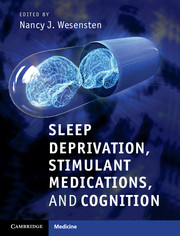Book contents
- Sleep Deprivation, Stimulant Medications, and Cognition
- Sleep Deprivation, Stimulant Medications, and Cognition
- Copyright page
- Contents
- Contributors
- Foreword: Sustaining cognitive performance: a modern imperative
- Preface
- Section 1 Basic Mechanisms: Cognitive Performance and Sleep
- Section 2 Stimulant Reversal of Cognitive Deficits
- Section 3 Alternatives for Sustaining Cognitive Performance During Sleep Loss
- Section 4 Summary and Conclusions
- Chapter 17 Use of stimulants in operational settings: issues and considerations
- Chapter 18 Fatigue management: the art of the state
- Index
Chapter 18 - Fatigue management: the art of the state
from Section 4 - Summary and Conclusions
Published online by Cambridge University Press: 05 September 2012
- Sleep Deprivation, Stimulant Medications, and Cognition
- Sleep Deprivation, Stimulant Medications, and Cognition
- Copyright page
- Contents
- Contributors
- Foreword: Sustaining cognitive performance: a modern imperative
- Preface
- Section 1 Basic Mechanisms: Cognitive Performance and Sleep
- Section 2 Stimulant Reversal of Cognitive Deficits
- Section 3 Alternatives for Sustaining Cognitive Performance During Sleep Loss
- Section 4 Summary and Conclusions
- Chapter 17 Use of stimulants in operational settings: issues and considerations
- Chapter 18 Fatigue management: the art of the state
- Index
Summary
Keywords
- Type
- Chapter
- Information
- Sleep Deprivation, Stimulant Medications, and Cognition , pp. 257 - 267Publisher: Cambridge University PressPrint publication year: 2012

